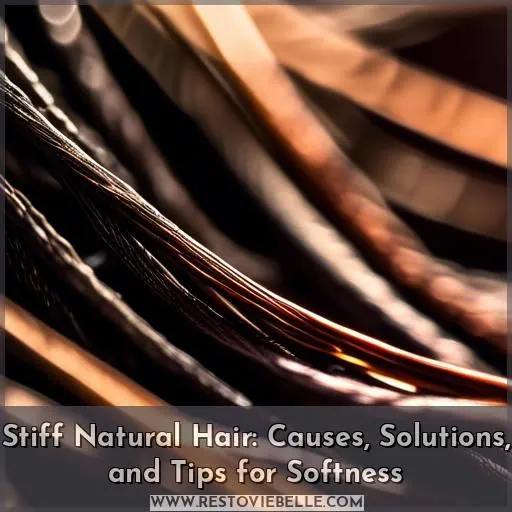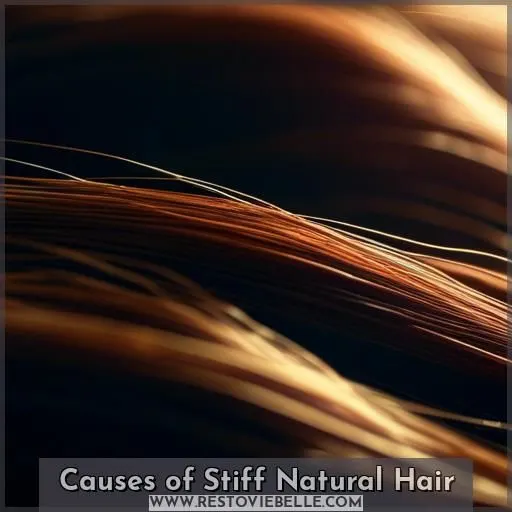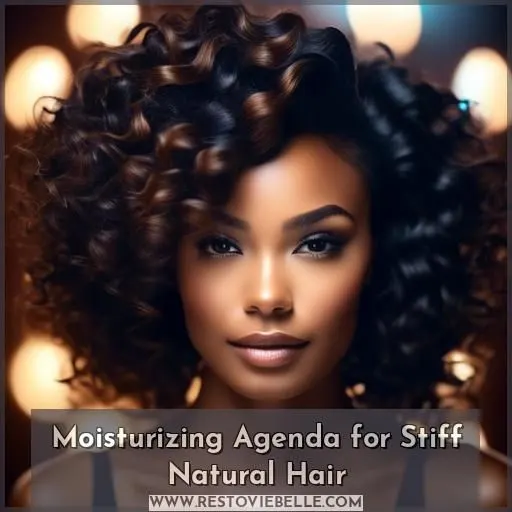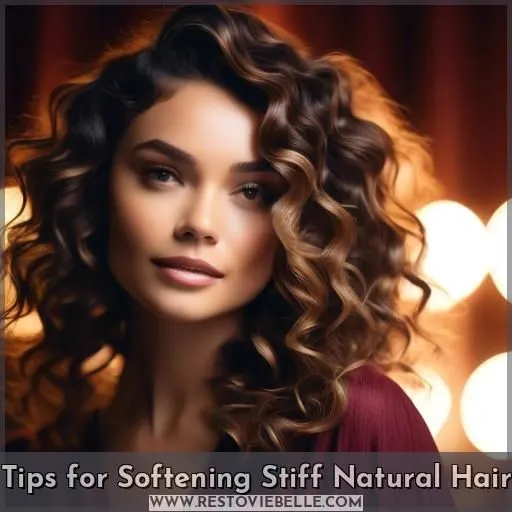This site is supported by our readers. We may earn a commission, at no cost to you, if you purchase through links.

Your hair might be stiff because it lacks moisture, is dry, has too much protein, or is affected by buildup from certain hair products. Stiffness is common in highly textured hair and can be more pronounced in the crown area.
To address this, cowash weekly, use a product line without cones, and incorporate humectants like soy wax or veggie waxes. Avoid water-based sprays and use shampoo bars for cleansing. Avoid commercial conditioners, glycerin, protein, silicones, and mineral oil.
Soften your hair by deep conditioning regularly, using leave-ins with humectants, and sealing in moisture with butters or oils. Avoid over-manipulation and use a steamer to add moisture.
Table Of Contents
Key Takeaways
- Lack of moisture or dryness is a common cause of stiff natural hair.
- Protein overload, buildup from silicones, mineral oil, and petroleum, and the use of stripping shampoos can also contribute to stiff hair.
- To address stiff natural hair, consider co-washing weekly, using a product line without cones, incorporating humectants like soy wax or vegetable waxes, avoiding water-based sprays, and opting for shampoo bars for cleansing.
- Regular deep conditioning, using leave-ins with humectants, sealing in moisture with butters or oils, and avoiding over-manipulation can help maintain softness and reduce hair breakage.
Why is My Hair So Stiff?
Your hair might be stiff due to several factors. Regular use of heat styling tools, over-processing through frequent coloring or chemical treatments, environmental stressors like sun and pollution exposure, and a lack of moisture can all contribute to stiff hair.
To soften your hair, you can try using a nourishing hair care system and incorporating a leave-in conditioner. Air-drying your hair and protecting it from the sun can also help. Minimizing your styling products is another option.
Deep conditioning masks or hot oil treatments can help restore moisture and hydrate your hair.
Causes of Stiff Natural Hair
If you’re experiencing stiffness in your natural hair, it’s likely due to a lack of moisture or dryness. Factors such as protein overload, buildup from silicones, mineral oil, and petroleum, as well as the use of stripping shampoos, can also contribute to this issue.
Lack of Moisture
Lack of moisture is a common cause of stiff natural hair. When your hair is dry, it can become brittle, leading to split ends, breakage, and a dull appearance. To address this issue, consider the following tips:
- Moisturize Regularly: Incorporate a weekly cowash into your routine to keep your hair hydrated.
- Choose the Right Products: Opt for a product line that doesn’t contain cones, which can strip your hair of moisture.
- Use Humectants: Humectants like soy wax or veggie waxes can help retain moisture in your hair.
- Avoid Water-based Sprays: Water-based sprays can dry out your hair, so avoid using them.
- Use Shampoo Bars: Shampoo bars can be gentler on your hair and scalp, reducing the risk of dryness.
Dryness
Dry hair can lead to stiffness and dullness. To combat dryness, avoid using products with harsh ingredients like sulfates, petroleum jelly, mineral oil, lanolin, and glycerin. Instead, opt for oils like castor oil or shea butter, and use a moisturizing leave-in conditioner. Regular deep conditioning with moisturizing products can also help maintain softness and volume.
Protein Overload
Protein overload in hair occurs when the hair is coated with excessive amounts of protein, which can hinder its quality and appearance. This condition is often caused by the use of hair products that contain a large amount of protein, such as shampoos, conditioners, and hair protein treatments. Low porosity hair, which can’t easily absorb moisture, is particularly prone to protein overload.
To avoid protein overload, it’s essential to use products with keratin as directed and avoid layering multiple keratin products on top of one another. Regular visits to a stylist can also help maintain the protein balance in your hair. If you suspect protein overload, look for signs such as split ends, brittle hair that snaps off easily, and hair that feels limp and lifeless.
To fix protein overload, you can use a clarifying shampoo to remove buildup and restore elasticity. A protein treatment can help tip the protein-moisture scale back to balance. It’s also important to use protein-rich products temporarily and then switch to hydrating formulas to maintain a healthy balance.
Buildup From Silicones, Mineral Oil, and Petroleum
Silicones, mineral oil, and petroleum can build up on your hair, making it stiff and lifeless. To combat this, avoid products containing these ingredients and opt for cone-less products. Regularly clarify your hair with a clarifying shampoo to remove buildup.
Use moisturizing conditioners that don’t contain sodium laureth sulfate. Opt for moisturizing conditioners and shampoo bars that are free of mineral oils.
Use of Stripping Shampoos
Stripping shampoos, which often contain sulfates and parabens, can cause stiff natural hair by removing the natural oils and moisture from your hair. These chemicals can leave your hair feeling dry and unhealthy, leading to a lack of elasticity and increased breakage.
To avoid this, consider using clarifying shampoos or chelating shampoos that are specifically designed to remove buildup without stripping your hair of its natural oils. Additionally, deep conditioning regularly and using moisturizing products can help maintain the softness and volume of your hair.
General Experiences With Stiff Natural Hair
If you’ve noticed your hair feeling particularly stiff, you’re not alone. Many with highly textured hair experience stiffness, especially in the crown area, indicating a need for targeted moisture strategies.
Stiffness is Common Among People With Highly Textured Hair
Rigidity is a widespread problem for individuals with highly defined natural hair. Here are five reasons why rigidity may be an issue for you:
- Natural hair texture: The texture of your natural hair can contribute to rigidity.
- Crown area stiffness: Rigidity can be more pronounced in the crown area.
- Protein buildup: Excessive use of protein-rich products can cause rigidity.
- Product buildup: Buildup from silicones, mineral oil, and petroleum can lead to rigid hair.
- Mineral deposits: Hard water can leave mineral deposits on your hair, causing rigidity.
To address these issues, consider the following tips:
- Moisture balance: Maintain proper moisture balance in your hair.
- Texlaxed hair: If adjusting from relaxed to texlaxed hair, use oil to protect relaxed ends.
- Moisturizing protein conditioner: Use a moisturizing protein conditioner to maintain softness.
- Porosity control: Use porosity control products to improve moisture absorption.
- Deep conditioning: Regular deep conditioning can help maintain softness and volume.
Stiffness Can Be Worse in the Crown Area
Stiffness can be worse in the crown area due to tension points, scalp irritation, and product layering. To address this issue, consider using a moisturizing leave-in conditioner to seal in moisture. Deep conditioning regularly and using a steamer can also help maintain softness and reduce hair breakage.
Avoid products with silicones, mineral oil, and petroleum, as they can contribute to stiffness. Instead, try sealing in moisture with butters or oils. Additionally, avoid over-manipulation of the hair to prevent further irritation.
Moisturizing Agenda for Stiff Natural Hair
To address stiff natural hair, consider cowashing weekly, using a product line with no cones, incorporating humectants like soy wax or veggie waxes, avoiding water-based sprays, and opting for shampoo bars for cleansing. These steps can help maintain moisture balance and promote softness in your hair.
Cowash Weekly
Cowashing your hair weekly is a vital part of maintaining moisture balance in your natural hair. Cowashing is a gentle cleansing method that uses conditioner instead of shampoo. It helps to avoid stripping your hair of its natural oils, which can lead to dryness and stiffness. Sulfate-free cowashing is recommended, as sulfates can be harsh and drying for natural hair. Deep conditioning after cowashing is also essential to restore moisture and prevent protein imbalance.
When choosing a cowash product, look for one that’s free of cones, as cones can coat the hair and make it appear soft while actually drying it out. Humectant properties are important for a cowash product, as they help to attract and retain moisture in your hair. Ingredients like glycerin, aloe vera, and panthenol can be beneficial for natural hair.
Remember to avoid over-manipulation** during the cowashing process, as this can cause damage and breakage. Instead, use a wide-tooth comb or your fingers to detangle your hair gently. After cowashing, you can apply a moisturizing leave-in conditioner with humectant properties to help seal in moisture and protect your hair from dryness.
Incorporating cowashing into your hair care routine can help to keep your natural hair hydrated, soft, and manageable.
Use a Product Line With No Cones
To achieve soft, manageable natural hair, it’s essential to avoid products with cones, which can hinder moisture retention and protein balance. Look for product lines that are cone-free, such as ORS Replenishing Conditioner, Nexxus Keraphix Moisturizing Protein Conditioner, and Pantene Clarifying Shampoo. These coneless options can assist you in maintaining a healthy hair care routine and enhance the overall condition of your hair.
Use Humectants Like Soy Wax or Veggie Waxes
Incorporating humectants like soy wax or veggie waxes into your hair care routine can be a game-changer for softening stiff natural hair.
- Soy wax benefits include locking in moisture without weighing down your locks.
- Veggie waxes for hair offer a natural, eco-friendly way to achieve that sought-after softness.
- Humectants in hair products work wonders by drawing moisture from the air, ensuring your hair stays hydrated and relaxed.
Avoid Water-based Sprays
Avoiding water-based sprays is a vital part of preserving soft, healthy natural hair. While water is indispensable for hydration, water-based sprays can desiccate your hair due to their vaporization properties. Instead, opt for humectants like soy wax or veggie waxes, which aid in retaining moisture in your hair.
If you’re uncertain about the moisture content in your hair, you can conduct a water test by spraying water on your hair and observing how rapidly it evaporates. If the water evaporates swiftly, your hair may be arid and in need of additional moisture.
To maintain moisture, utilize a moisturizing leave-in conditioner, seal in moisture with butters or oils, and avoid excessive manipulation.
Use Shampoo Bars for Cleansing
Shampoo bars are a game-changer for stiff natural hair. They offer numerous benefits, such as being gentle on hair, free of harsh chemicals, and often containing natural ingredients. When choosing a shampoo bar, consider your hair type and the ingredients.
Shampoo bar brands like Lush, Ethique, and The Seaweed Bath Co. provide a variety of types, including solid shampoo bars and shampoo bar bars. Shampoo bar comparisons show that they’re often more sustainable and cost-effective than traditional shampoo bottles.
Products to Avoid for Stiff Natural Hair
Avoid products that contribute to stiff natural hair. Commercial conditioners, glycerin, protein, silicones, and mineral oil can all cause stiffness.
Commercial Conditioners
Commercial conditioners often contain ingredients like silicones that can contribute to stiffness and buildup in natural hair. Silicones, which end in cone or xane, can create a barrier that traps sweat, oil, or product residue, potentially leading to irritation or follicle blockage. Over time, these silicones can accumulate on the hair, weighing it down and giving it a dull appearance.
To avoid these issues, consider using silicone-free conditioners or products that use lighter, water-soluble silicones that can be easily rinsed from the hair.
Products With Glycerin
Glycerin is a humectant that can be advantageous for hair health, but it can also lead to complications when used excessively. Here are reasons to steer clear of products with glycerin for inflexible natural hair:
- Overzealous Moisture Retention: Glycerin can draw in moisture, which can be beneficial for dry hair but can cause rigidity and buildup in already moisturized hair.
- Product Buildup: Overuse of glycerin can result in product buildup, which can weigh down hair and cause rigidity.
- Porosity Issues: Glycerin can disrupt the natural moisture balance of hair, making it difficult for hair to absorb moisture effectively.
- Hair Damage: Excessive glycerin can cause hair to expand, leading to damage and breakage.
To maintain healthy, supple natural hair, it’s imperative to avoid products with glycerin and choose humectants like soy wax or veggie waxes instead.
Products With Protein
Protein is essential for hair health, but too much of it can lead to stiffness. Protein treatments can help restore elasticity, but overuse can cause protein sensitivity. Aim for a protein-moisture balance and avoid products with excessive protein if your hair is prone to stiffness. Use protein treatments sparingly and deep condition regularly to maintain moisture balance.
Products With Silicones
Silicones are synthetic substances widely used in hair care products due to their lubricating properties and the smooth, silky feel they create in hair. However, they can also cause buildup on the hair surface, which can lead to dryness, brittleness, and breakage over time.
To avoid stiff natural hair caused by silicone buildup, it’s imperative to avoid products containing non-water-soluble silicones like Dimethicone, Cyclomethicone, Amodimethicone, Phenyl Trimethicone, Cetearyl Methicone, and Dimethiconol.
Instead, opt for water-soluble silicones that can be easily removed with water, or silicones that evaporate from the hair after application.
Products With Mineral Oil
Mineral oil is a common ingredient in hair products, but it can contribute to stiffness and buildup in natural hair. To avoid mineral oil buildup, consider using mineral oil alternatives like castor oil or jojoba oil.
If you’ve already experienced mineral oil damage, consider using a clarifying shampoo or chelating shampoo to remove mineral oil deposits. Regular deep conditioning and porosity control products can also help maintain softness and volume.
Tips for Softening Stiff Natural Hair
To soften stiff natural hair, deep condition regularly, use leave-ins with humectants, seal in moisture with butters or oils, avoid over-manipulation, and use a steamer to add moisture.
Deep Condition Regularly
Deep conditioning is a vital step in preserving healthy, hydrated natural hair. It assists in replenishing moisture and ameliorating the overall health and maneuverability of your hair. Here are three recommendations on how to deep condition your hair effectively:
- Select the appropriate deep conditioner: Seek a deep conditioner that’s explicitly engineered for your hair type and concerns. Moisture-attracting agents, softening agents, and fatty alcohols can aid in providing moisture and enhancing smoothness, while hydrolyzed proteins, amino acids, and emollients can re-establish the balance between protein and moisture and augment hair strength.
- Modify your routine: Determine how frequently you necessitate deep conditioning based on your hair’s condition and your individual preferences. Most natural hair types derive benefits from deep conditioning every week or every fortnight, but this can vary contingent on your hair’s requirements.
- Porosity assessment: Comprehend your hair’s porosity to ascertain that you’re employing the most effectual deep conditioning treatments. Highly porous hair may not necessitate heat to permeate the hair follicle, while hair with low porosity may reap benefits from the inclusion of heat.
Use Leave-ins With Humectants
Humectants are essential for maintaining the softness and hydration of natural hair. They work by attracting water molecules from the environment and binding them to the hair shaft, which helps to hydrate and protect your locks. Here are some tips on how to use humectants effectively to soften your stiff natural hair:
- Choose the right humectants: Natural humectants like glycerin, honey, panthenol, and lecithin are beneficial for natural hair types. Synthetic humectants like propylene glycol, ethylene/diethylene glycol, and PEG compounds can also be effective, but they may cause irritation for those with sensitive skin.
- Use humectants in leave-in conditioners: Humectants are often found in leave-in conditioners, which can help to seal in moisture and protect your hair from damage.
- Balance humectant use with anti-humectants: Using a combination of humectants and anti-humectants can help to maintain a balanced moisture level in your hair. Anti-humectants, such as plant-based butters, oils, natural waxes, and lanolin, can help to smooth the cuticle and prevent your hair from absorbing too much moisture.
- Consider the weather: In dry conditions, you may need to reduce the amount of humectants you use or avoid them altogether to prevent your hair from becoming overly dry. In high humidity, you may need to incorporate a protein treatment to balance the moisture-to-protein ratio in your hair.
- Check product labels: The first five ingredients in a product account for approximately 80% of its content, so if a humectant is listed within these, the product is likely to be humectant-rich. If you want to avoid humectants, it’s best to choose products where the humectant is listed below the first five ingredients.
Seal in Moisture With Butters or Oils
After using leave-ins with humectants, it’s essential to protect that moisture. Think of shea butter and oils like a cozy cover for your hair, preventing the hydration from evaporating.
- Apply shea butter or oils like coconut, jojoba, or avocado as sealing agents.
- Concentrate on ends, the driest part of your hair.
- Use sparingly; a little goes a long way.
Avoid Over-manipulation
Avoid over-manipulation to prevent hair breakage and heat damage. Practice gentle detangling with your fingers or a wide-tooth comb. Protective styling can also help reduce manipulation. Remember, moderation is key for handling your natural hair.
Use a Steamer to Add Moisture
Using a steamer to add moisture to your hair is a great way to improve its health and appearance. Here’s how you can do it:
- Deep Cleansing: Steam helps open the cuticle, allowing cleansers and sulfate-free shampoos to remove buildup effectively.
- Deep Conditioning: After cleansing, apply a leave-in conditioner like the Monoi Repairing Leave-In Conditioner and direct the steamer at that area for a more concentrated steam.
- Moisture Penetration: Steaming allows conditioners to settle in beneath the surface, moisturizing hair from the inside out.
- Hair Growth: Steaming can be beneficial for those working to grow out their natural hair, as it promotes overall hair health.
- Porosity Control: Steaming can help low porosity hair absorb moisture better, especially when done after washing with a sulfate-free shampoo.
Remember to use a hair steamer at home, as it’s compact and doesn’t require a major salon setup. Handheld versions look like blow-dryers and can be used to focus your moisture-boosting efforts on specific areas. Always follow the manufacturer’s instructions for use and safety.
Conclusion
Ironically, while you might’ve thought stiff hair was a sign of strength, it’s actually crying out for moisture and care. Addressing why your hair is so stiff involves a delicate balance of avoiding harsh ingredients and embracing nourishing practices.
By co-washing, avoiding certain products, and regularly deep conditioning, you’re on your way to softer, more manageable hair. The key to revealing the softness in your stiff natural hair lies in consistent, gentle care.











